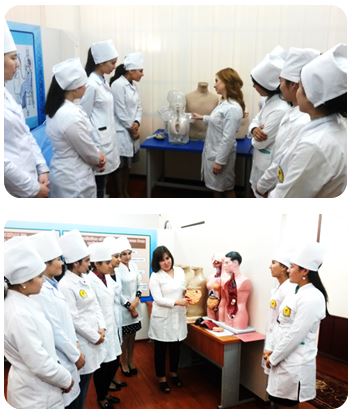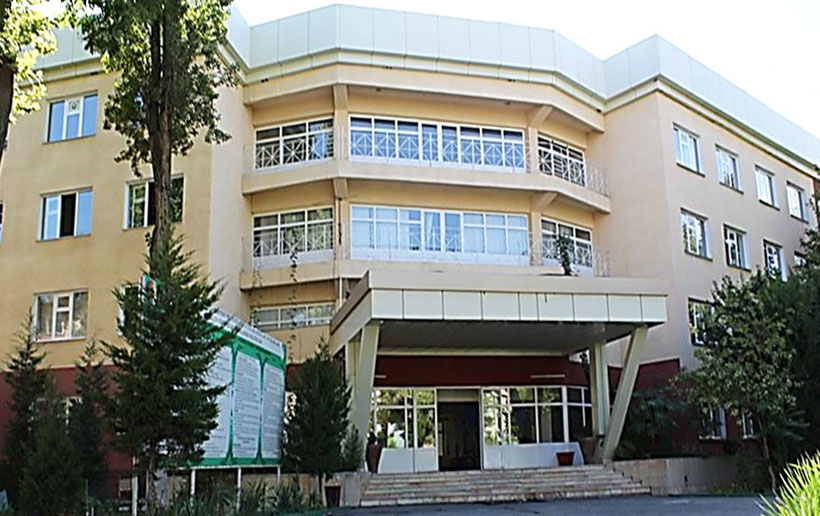TASHKENT MEDICAL ACADEMY
HQN faculty was founded in 1999. Now there are 5 chairs,about 60 professors , 5 of them are doctors of science,13 doctorsof science and senior teachers, assistants.This faculty teach the high qualified nurses.
Direction of education 5510700 – High Qualified nursery
Form of the study : full-time
Duration of the study: 3 years
Speciality: High qualified hurse
After graduating this faculty the students work at the following fields:
- nursery
- medical colleges
- surgery
- anestiology-reanimation
- Gynecology and obstetrics and physician -statist
The graduates of this faculty may continue their study at the magistracy “Forming and managing of the nursing” for 2 years.
The address of receiving the documents: The Tashkent medical academy building № 3

The process of receiving the documents
HIGH-QUALIFIED NURSE FACULTY
(Higher nursing work)
Eraliev Umidjan Ergashovich
Dean
+99871 150-78-34
e-mail:
In accordance with the decree of the President of Republic of Uzbekistan in the 10th of November, 1998 “About the state program of Reforming the Healthcare System in the Republic of Uzbekistan” UP-2107, from 1999-2000 academic year in all medical institutions of the Republic “Faculty of High nursing” has been functioning under the department of ” The high qualified nurses training “.
In 1999-2000 it was established the department of “The high qualified nurses training” under the Medical pedagogical faculty in the First and the Second Tashkent Medical institutes.
A head of the department of “The high qualified nurses training” in the 1st TMI was an assistant professor of Ophthalmology department, PhD Yangiyeva N.R. and MD, professor Rahimbayeva G.S.was in the 2nd TMI respectively. At that time there were 38 students in the 1st -TMI and 40 students in the 2nd -TMI. In 2002 the department of “The high qualified nurses training” has been changed to the department of “High educated nurses”. In 2002 MD, Umarov R.H. was appointed as a head of the department of “High educated nurses” in the 2nd -TMI. From 2003 MD, professor Bobojonova Sh.A. has been appointed as a head of the department.
According to the PQ-3629 in 19th of July, 2005 the decree the President of the Republic of Uzbekistan on the basis of cancelled the First and the Second Tashkent Medical institutes it was established Tashkent Medical Academy and the faculty of “High educated nurses”. Bobojonova Sh.A. has been appointed as a dean of the faculty. In that period a number of students consisted of more than 100.
From 2007 MD, Khalmatova B.T. was a dean of faculty. From those years faculty of High educated nurses started developing as a faculty. In all fields, for instance, sport, spiritual events and in the sphere of knowledge the faculty was in the leader positions. Under the leadership of the dean Khalmatova B.T. it has been launched the faculty’s Scientific Council. From 2010-2011, six departments were attached to the faculty. They are: Nursing, Forensic medicine and medical law, the 1st social sciences, the 1st languages, pedagogics and psychology, obstetrics and gynecology and Public health and management of healthcare.
From 2011 to 2015 MD, professor Rustamova H.E. was a dean of faculty of High educated nurses. In 2011 under the control of the dean it was launched faculty’s educational and methodological council works.
In 2015-2016 the candidate of philosophy,docent Norkulov S.D. has been working in the faculty and reached many achievements.
In 2016 the docent of the ENT department of TMA, Bakieva Shahlo Hamidullayevna has been appointed as a dean of the faculty of High educated nurses.
5510700 – “High nursing work” course of study
– In particular, attention is given to the quality of practical lessons and lectures.
– New pedagogical technologies are widely used in the learning process.
– Educational-methodical manuals and literature on all disciplines have been created and updated.
– Practical lessons on clinical sciences are conducted in the laboratory and the QVP module, which are designed to teach practical skills.
Particular attention is paid to clinical practice in this standard, i.e, 50% of clinical practice and 50% is allotted to theory. Practical skills are taught in the classroom during practical exercises in the classroom, and clinical practice is run by the clinic in the presence of the supervision of the teacher and the experienced “leader” nurse. New STC includes- Nursing, health and disease sociology; psychology, human development, medical and pharmaceutical production, infection control, evidence-based medicine, practical use of scientific research, and foreign language for nurses.
At present, the process of preparing nurses with high education is radically changed, they are trained in four major specialties: Nursing in the anesthesiology and intensive care unit; nurse work on the surgical unit; nurse work in the obstetric block; nursing management.
Currently, the number of nurses with higher education in the country is 1860. Graduates of this faculty work in various colleges and health care system, including: 24.6% are teachers in different colleges, 15.3% are major nurses at major DPMs and major nurse offices, 4.2% with anesthesiology and reanimation, nurse at the surgery departments, 3.6% leading nurses and 2.5% study at the master’s department.
The graduates of the «High Educated Nurses» (HEN) faculty are in great demand, and they should be ready to carry out the following types of professional activities:
- treatment-prophylactic;
- organizational and management;
- information and analytical;
- marketing;
- innovative;
- rehabilitation;
- educational and pedagogical;
- methodological;
- advisory;
- scientific research.
Therefore, it is necessary to further improve the teaching process in order to train the personnel in line with the modern requirements. For HEN faculty students this year is to establish an HEN center for the purpose to maximize the learning process to healthcare practices, to deepen the practical skills, and to strengthen interdepartmental integration of nurses in higher education. In this center 6 educational departments (therapeutic, surgical, maternity and childhood, laboratory and instrumental diagnostics, interpersonal communication skills, management and leadership), library, reading hall, computer class are planned to be established. On the basis of the plan 1st, 2nd, 3rd course students will have practical classes and will be trained with practical skills of care, phantoms and other teaching aids.
Improving nursing care in the country is largely due to the continuous improvement of the role and importance of professionals, organization and management of nursing work using the best practices of leading nations in the world and science. One of the main principles of creating a highly effective system of nursing work and management is training of specialists in this direction.
As time requires, retraining of personnel will further increase the confidence in the future generations, which will increase the professional development of our specialists and to achieve positive results. For this purpose, each of us should act responsibly in the direction of the whole country, using all the conditions created under the care of the state, and we should work effectively in retraining.
The prospect of nursing care development:
- provide full support to researchers
- improving collaboration with other universities
- developing clinical standards and requirements for nursing students with higher education
- determine the principles of nurse assessment
- training of nursing managers
- improving the management of nursing
- developing quality indicators for practical training and nursing
FACULTY EDUCATIONAL LIFE
- The HEN faculty prepares highly qualified specialists with a high degree of theoretical and practical knowledge on the nursing process in healthcare.
- Faculty students are trained in four directions: Obstetrics, Anesthesiology-Intensive Care, Surgery, Management direction.
- 15professors, 35 candidates of science, associate professors and 40 assistants have been teaching the faculty students.
- Departments of the faculty are trained to provide the students with the latest information and the latest technologies in the classroom, which will provide them with sufficient knowledge on the subject.
Duration of study is 3 years (bachelor)
TRAINING BASES
- The Tashkent Medical Academy, the department of High Educated Nursing is a basic higher education institution for all 5510700 – High Nursing education in all medical institutions of the country.
- After graduating from the faculty of HEN, you can continue to study at the Master’s department in Nursing Management.
- Graduates of the HEN faculty continue to work as leading nurses, physicians, statist, deputy nurses and nurses at higher educational institutions and medical colleges.
In 2013, the HEN training center was established for students of the faculty and students are taught the followings:
- Organization of medical documentation;
- Practical skills training for therapeutic patients;
- Practical skills training for qualified and reanimation patients;
- Prepare practical skills for pregnant women, maternity and post-natal care;
- Training of modern equipment, preparation of patients for laboratory and instrumental examinations;
- Teaching interpersonal communication in nursing practices;
- Wide use of interdisciplinary integration in the teaching of students;
- High levels of clinical management of final control.
At present there are 267 students at the faculty. In addition to basic medical sciences, foreign language and computer techniques are also taught. Students of the faculty take an active part in all events organized by the TMA.



